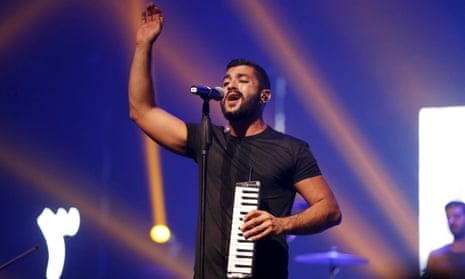In the seven years since Mashrou’ Leila formed at the American University of Beirut, the quintet – whose name, in fact, means “overnight project” – have won comparisons to everyone from Arctic Monkeys and Radiohead to Roxy Music and Wild Beasts. It’s a promising set of references that the backdrop of guitar, bass and drums would struggle to meet were it not for the band’s twin poles of flamboyance: violinist Haig Papazian and vocalist Hamed Sinno. At this launch concert for their fourth album, Ibn el Leil, the two even look subtly different from their bandmates, with leather bands tied around their wrists and sequinned T-shirts shorn of sleeves. They charge the stage with electricity, sensuality and a dazzling aura of resistance.
That resistance, in an Arab context, registers in Sinno’s authority-baiting lyrics, his references to checkpoint thuggery, shootings, club culture and gay desire. In a western context, it surfaces in his refusal to sing in English. At this gig, he also mostly speaks in Arabic between songs, mindful of the audience watching a simulcast on MTV Lebanon. It’s a mark of his magnetism that, as a film of Beirut floods a screen at the back of the stage, this split focus creates a thrilling sense of cross-cultural togetherness.
The music conveys a similar intertwining. Papazian’s violin slices through the thumping drum pattern of Im-bim-billilah; it brings space and question to Asnam, from the new album; and in Taxi, its sinuous smokiness is haunted by Papazian’s Armenian roots. Sinno’s vocal dances with the violin as though courting a lover: in Aoede, the sound is fluid and eerie, a mercurial contralto; in Marrikh, it trembles before soaring into sustained high notes. It’s such an impressive performance that stadiums seem not only possible but imminent.

Comments (…)
Sign in or create your Guardian account to join the discussion